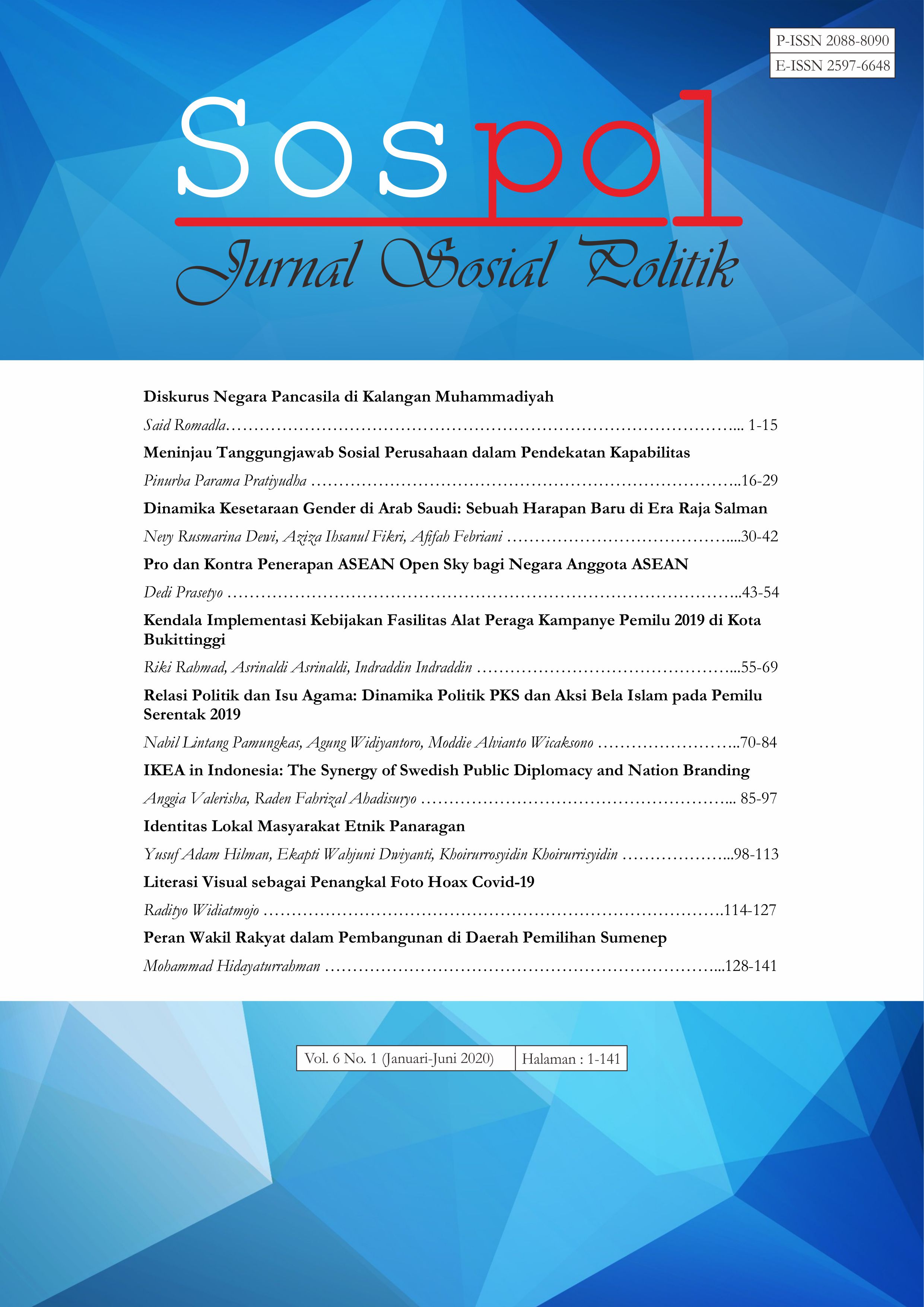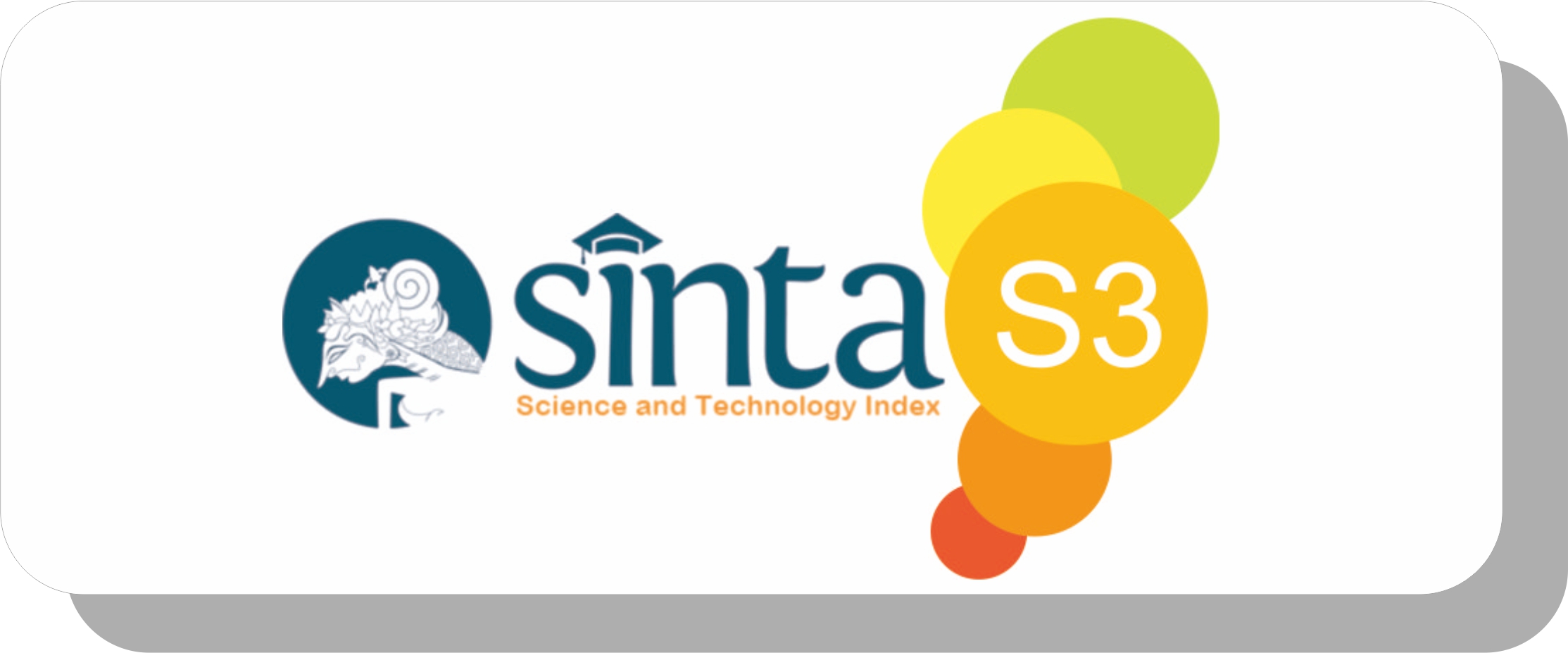Relasi Politik dan Isu Agama: Dinamika Politik PKS dan Aksi Bela Islam pada Pemilu Serentak 2019
DOI:
https://doi.org/10.22219/sospol.v6i1.11155Keywords:
religion, Aksi Bela Islam, elections, PKS, politics.Abstract
This paper believes the tendency to use religious issues as a political instrument in the momentum of elections in Indonesia. Some research said the issue of religion is a supporting factor for polarization in society and influences the subjectivity of voters in determining the representation of their aspirations. The author is interested in the consistency of the Prosperous Justice Party (PKS) political support for the Aksi Bela Islam (Islamic Defending Action) which emerged as a movement that raised the issue of blasphemy and the criminalization of Ulama. This study aims to analyzing the potential of PKS using religious issues as political instruments to obtain and strengthen support in elections. This research uses a library method in which there are several literatures and scientific sources that are relevant to the focus of the case. Political relations formed through religious issues between PKS and Aksi Bela Islam from 2016 to the 2019 Election were so dynamic. The results of the study interpret the PKS's political attitude against Aksi Bela Islam as (1) political support that reflects the practice of Indonesian democracy, (2) PKS calls on Muslims to actively participate in every agenda of the Aksi Bela Islam, by obeying and following the fatwas of Islamic leaders who delivered in the forum, and (3) PKS calls for not choosing leaders who have criminalized Ulama. Thus, studies show that PKS has an electoral interest behind political relations with Aksi Bela Islam by utilizing religious issues.
Downloads
References
Adiwilaga, R. (2017). Political islam movement and historical project of islamism enforcement in indonesia. Jurnal Wacana Politik, 2(1), 1–9.
Afala, L. M. (2018). Politik Identitas di Indonesia. Malang: UB Press.
Aliansyah, M. A. (2019). GNPF dan PA 212 Temui Elite PKS, Bahas Dukungan Politik dan Kasus Slamet Ma’arif. Retrieved from https://www.merdeka.com/peristiwa/gnpf-dan-pa-212-temui-elite-pks-bahas-dukungan-politik-dan-kasus-slamet-maarif.html
Aminuddin, F. (2010). Reorganisasi Partai Keadilan Sejahtera Di Indonesia. Journal of Government and Politics, 1(1), 129–144. https://doi.org/10.18196/jgp.2010.0008
Aminuddin, M. F., & Masykuri, R. (2016). Genealogi dan Transformasi Ideologi Partai berbasis Islam di Indonesia Pasca Orde Baru. ISLAMICA: Jurnal Studi Keislaman, 10(1), 27. https://doi.org/10.15642/islamica.2015.10.1.27-55
Arrobi, M. Z. (2020). Islamisme ala Kaum Muda Kampus: Dinamika Aktivisme Mahasiswa Islam di Universitas Gadjah Mada dan Universitas Indonesia di Era Pasca-Soeharto. Yogyakarta: Gadjah Mada University Press.
Bonasir, R. (2017). Dengan 212, umat Islam “ingin berkuasa lewat pilkada, pemilu dan pilpres.” Retrieved November 12, 2019, from https://www.bbc.com/indonesia/indonesia-42184928
Carvalho, J.-P. (2009). A Theory of The Islamic Revival. Retrieved from https://www.economics.ox.ac.uk/department-of-economics-discussion-paper-series/a-theory-of-the-islamic-revival
CNNIndonesia.com. (2018). PKS soal PSI Tolak Perda Syariah: Hanya PKI yang Tolak Agama. Retrieved from https://www.cnnindonesia.com/nasional/20181113151857-32-346207/pks-soal-psi-tolak-perda-syariah-hanya-pki-yang-tolak-agama
Crouch, H. (1979). Patrimonialism and Military Rule in Indonesia. World Politics, 31(4), 571–587. https://doi.org/doi:10.2307/2009910.
Folia, R. (2019). Global Risk Report 2019: Polarisasi Politik di Masyarakat Kian Tajam. Retrieved November 22, 2019, from https://www.idntimes.com/news/world/rosa-folia/global-risk-report-2019-polarisasi-politik-di-masyarakat-kian-tajam/full
Forest, B. (2017). Electoral geography: From mapping votes to representing power. Geography Compass. https://doi.org/https://doi.org/10.1111/gec3.12352
Hadiz, V. R. (2019). Populisme Islam: di Indonesia dan Timur Tengah. Jakarta: Universitas Indonesia & LP3ES.
Heryanto, A. (2018). Identitas dan Kenikmatan: Politik Budaya Layar Indonesia. Jakarta: Kepustaaan Populer Gramedia.
Horowitz, D. L. (1985). Ethnic Groups in Conflict. California: Univ of California Press.
Imam, P. (2013). Penyebutan Perda Syariah Tidak Tepat. Retrieved from https://nasional.kompas.com/read/2013/01/11/10350759/Penyebutan.Perda.Syariah.Tidak.Tepat
Jpnn.com. (2017). Politikus PKS Kecam Polisi Soal Penangkapan Sekjen FUI. Retrieved from https://www.jpnn.com/news/politikus-pks-kecam-polisi-soal-penangkapan-sekjen-fui
Jpnn.com. (2018). Bisa Jadi Ini Sebab PKS Ngebet agar Kadernya Ikut Reuni 212. Retrieved from https://www.jpnn.com/news/bisa-jadi-ini-sebab-pks-ngebet-agar-kadernya-ikut-reuni-212
Junita, N. (2019). Ternyata, 2 Hal Ini Penyebab Perolehan Suara PKS Naik di Pemilu 2019. Retrieved from https://kabar24.bisnis.com/read/20190418/15/913205/ternyata-2-hal-ini-penyebab-perolehan-suara-pks-naik-di-pemilu-2019
Kumparan. (2019). PKS, Meroket Berkat Bangkitnya Politik Identitas. Retrieved from https://kumparan.com/kumparannews/pks-meroket-berkat-bangkitnya-politik-identitas-1qyoLqhS2mV
Kusumo, R., & Hurriyah. (2018). Populisme Islam di Indonesia: Studi Kasus Aksi Bela Islam oleh GNPF-MUI Tahun 2016-2017. Jurnal Politik, 4(1), 87–114. https://doi.org/https://doi.org/10.7454/jp.v4i1.172
Lane, J.-E., & Ersson, S. (1987). Politics and Society in Western Europe. London: Sage.
Lawson, K. (1980). Political Parties and Linkage. In K. Lawson (Ed.), Political Parties and Linkage (pp. 3–24). New Heaven, CT: Yale University Press.
Lipset, S. M. (1960). Political Man: The Social Bases of Politics. Retrieved from http://www.archive.org/details/politicalmansociOOinlips
Maulidar, I. (2019). Mardani Ali Sera: Suara PKS Naik karena Efek 212. Retrieved from https://nasional.tempo.co/read/1198032/mardani-ali-sera-suara-pks-naik-karena-efek-212
Mietzner, M. (2008). Comparing Indonesia’s party systems of the 1950s and the post-Suharto era: From centrifugal to centripetal inter-party competition. Journal of Southeast Asian Studies, 39(3), 431–453. https://doi.org/10.1017/S0022463408000337
Muhtadi, B. (2012). Dilema PKS: Suara dan Syariah. Jakarta: Kepustaaan Populer Gramedia.
Mujani, S., Liddle, R. W., & Ambardi, K. (2019). Kaum Demokrat Kritis. Jakarta: Kepustaaan Populer Gramedia.
Mustika, Z. (2008). Metode Penelitian Kepustakaan. Jakarta: Yayasan Obor Indonesia.
Neidhardt, F., & Rucht, D. (1993). Auf dem Weg in die “Bewegungsgesellschaft”? Über die Stabilisierbarkeit sozialer Bewegungen. Soziale Welt, 44, 305–326.
Okezone.com. (2016). PKS Ajak Warga Berpartisipasi dalam Aksi 212. Retrieved from https://nasional.okezone.com/read/2016/11/30/337/1554962/pks-ajak-warga-berpartisipasi-dalam-aksi-212
Pamungkas, A. S., & Octaviani, G. (2017). Aksi Bela Islam dan Ruang Publik Muslim: Dari Representasi Daring ke Komunitas Luring. Jurnal Pemikiran Sosiologi, 4(2), 65. https://doi.org/10.22146/jps.v4i2.28581
Pepinsky, T. (2019). Pembelahan Agama dan Etnis dalam Pilpres 2019. Retrieved from https://tirto.id/pembelahan-agama-dan-etnis-dalam-pilpres-2019-eamN
PKS. (2019). Visi Misi Partai Keadilan Sejahtera. Retrieved from http://pks.id/content/visi-dan-misi
Poguntke, T. (2000). Parteiorganisation im Wandel. Gesellschaftliche Verankerung und organisatorische Anpassung im europäischen Vergleich. Wiesbaden: Westdeutscher Verlag.
Poguntke, T. (2005). Parties without firm social roots? Party organisational linkage. In K. R. Luther & F. Muller-Rommel (Eds.), Political Parties in the New Europe: Political and Analytical Challenges (pp. 43–62). Oxford: Oxford University Press.
Poguntke, T. (2006). Political parties and other organizations. In R. S. Katz & W. Crotty (Eds.), Handbook of Party Politics (pp. 396–405). London: Sage Publications.
Poltracking. (2017). Peta Elektabilitas Kandidat Gubernur dan Preferensi Pemilih. (November), 1–63. Retrieved from https://poltracking.com/wp-content/uploads/2017/12/Laporan-Survei-Poltracking-Pilkada-Jabar-2018-Peta-Elektabilitas-Kandidat-Gubernur-dan-Preferensi-Pemilih.pdf
Rahmat, M. I. (2008). Ideologi politik PKS : dari masjid kampus ke gedung parlemen. Yogyakarta: LKIS.
Septianto, B. (2018). PKS Serukan Kadernya Ikut Reuni 212, Kubu Jokowi: Makin Jelas Ada Motif Politik. Retrieved from https://news.okezone.com/read/2018/11/29/605/1984314/pks-serukan-kadernya-ikut-reuni-212-kubu-jokowi-makin-jelas-ada-motif-politik
Shodiq, F., & Masykuri, R. (2019). Marketing Isu Agama Daam Pemilihan Kepala Daerah di Indonesia 2015-2018. Jurnal Penelitian Politik, 15(726).
Stokke, K. (2013). Conceptualizing the politics of citizenship. PCD Journal, 25(iv), 1–46.
Viva.co.id. (2017). VIDEO: Penyebar Selebaran SARA Pilkada DKI Ditangkap. Retrieved from https://www.viva.co.id/berita/metro/352574-video-penyebar-selebaran-sara-pilkada-dki-ditangkap
Webb, P. (1992). Trade Unions and the British Electorate. Aldershot: Dartmouth.
Downloads
Published
How to Cite
Issue
Section
License
Authors who publish with this journal agree to the following terms:
- Authors retain copyright and grant the journal right of first publication with the work simultaneously licensed under a Creative Commons Attribution-ShareAlike 4.0 International License that allows others to share the work with an acknowledgement of the work's authorship and initial publication in this journal.
- Authors are able to enter into separate, additional contractual arrangements for the non-exclusive distribution of the journal's published version of the work (e.g., post it to an institutional repository or publish it in a book), with an acknowledgement of its initial publication in this journal.
- Authors are permitted and encouraged to post their work online (e.g., in institutional repositories or on their website) prior to and during the submission process, as it can lead to productive exchanges, as well as earlier and greater citation of published work (See The Effect of Open Access).

This work is licensed under a Creative Commons Attribution-ShareAlike 4.0 International License.



















